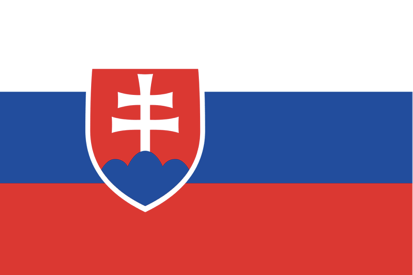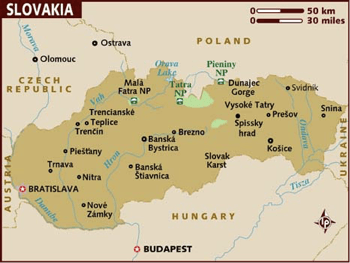
A Slovakia S.R.O. Company is the most popular type of corporation for foreigners. Similar to a limited liability company in other countries, the S.R.O. is a separate legal entity from its shareholders. Foreigners can own all of the shares in a S.R.O.
S.R.O. stands for “Spoloènos s Ruèením Obmedzeným” which can be translated into a “Company with Liabilities Limited”.
The S.R.O. was designed for small to medium sized companies looking for growth in a healthy developing economy.
The main law governing a S.R.O. is the Commercial Code of 1991 with later amendments. The Commercial Code regulates:
• Domestic and foreign companies business activities;
• Different types of cooperatives and business enterprises; and
• Types of business obligations, contracts, and shared provisions.
Background
Slovakia is a Central European landlocked country bordered by Austria and the Czech Republic to the west, Ukraine to the east, Poland to the north, and Hungry to the south.
Slovakia used to be part of Czechoslovakia when in 1945 it became a Soviet satellite under Communist rule. The Velvet Revolution of 1989 ended the Communist rule. Slovakia was granted its independence in 1993 during the Velvet Divorce which peacefully dissolved Czechoslovakia into two countries. The other country is the Czech Republic.
It is officially called the “Slovak Republic”. Its political system is described as a “parliamentary republic” with an elected one house assembly, a prime minister, and a president. Slovakia joined the European Union (EU) in 2004.
Today, Slovakia enjoys an advanced economy with a high income average and standard of living. Slovakia earns high rankings for freedom of the press, civil liberties, democratically elected government, internet freedom, and being a peaceful country.

Benefits
A Slovakia (S.R.O.) Company offers the following benefits:
• Full Foreign Ownership: The shares in a S.R.O. can be all owned by foreigners.
• Limited Liability: A shareholder’s liability is limited to his or her contribution to the share capital.
• Privacy: Nominee shareholders are permitted offering greater privacy.
• One Shareholder and One Director: Only one shareholder is required who can be the sole director in order to fully control the S.R.O.
• Low Capital: Each shareholder must contribute at least 1,000 Euro towards a minimum share capital of 6,600 Euro.
• EU Membership: Slovakia is a member of the European Union (EU) affording opportunities to open branch offices throughout the EU.
Slovakia (S.R.O.) Company Name
Every S.R.O. must choose a company name not already used by a registered legal entity in Slovakia. A proposed company name may be reserved in advance of the application for up to 10 days.
A company name may be in any language as long as a certified translation is provided when registering a new company.
Company names must end with the abbreviation “S.R.O.”.
Limited Liability
Shareholders in a S.R.O. are only liable for the value of their subscribed share capital.
Duration
S.R.O.’s life span is perpetual.
The S.R.O. does not dissolve when a major shareholder withdraws.
Branches may be opened in all EU member countries. Subsidiary companies may be formed in other EU countries.

Formation
The process of formation and registration with the government involves:
• Two or more shareholders sign a contract of association (often called an Articles of Association in other countries). The terms and conditions of the company and its shareholders are described in this contract. If the S.R.O. has only one shareholder, instead of a contract of association, a foundation charter is executed. Either the contract of association or the foundation charter is signed in front of a notary public who authenticates the documents and signatures which becomes a “notarial deed” which is filed with the Business Register.
• A formal application is made with the Business Register signed by all of the initial shareholders or the authorized legal representative of the company. The supplication includes the company name, registered office address, range of business activities, and value of the initial capital.
• A written statement showing the amounts of investments made by each shareholder is also executed. A bank statement verifying all of the deposits in a local bank must be filed.
• The registered office must be disclosed where the local government verifies the place of business based on proof of occupancy such as a signed lease agreement.
• If a trade license is needed for the type of business, the Trade Law of 1991 provides the process for obtaining a trade license from the Business Register.
• If any of the shareholders or the appointed director(s) are foreigners planning in residing in Slovakia, an immigration residency visa must be applied for with the local police department.
Shareholders
Only one shareholder is required to form a S.R.O. Shareholders are not required to be residents of Slovakia and can be citizens of any country. However, non-EU or non-OECD shareholders must be reviewed before incorporation is approved by the government.
Natural persons or corporate bodies may become shareholders. The maximum number of shareholders permitted is 50.
Beneficial owners can seek greater privacy by using nominee shareholders which are permitted in Slovakia.
Separate shares classes with different dividend rights are allowed. The company’s Articles of Association must specify the types of shares to be issued along with their voting and dividend rights.
Directors
A minimum of only one director is required for the S.R.O. The sole shareholder may be appointed as the only director for maximum control. Directors do not have to reside in Slovakia and may be nationals from any other country. However, non-OECD or non-EU directors must be approved by the government prior to becoming a director.
Minimum Share Capital
The required authorized minimum share capital is 200,000 SKK (currently 6,600 Euro). Each shareholder must make a minimum investment of 30,000 SKK (Currently 1,000 Euro).
Registered Office
Every company in Slovakia must maintain a registered office to accept legal and official notices. In addition, the registered office is where all important company accounting records, registers, and reporting documents are kept.
Accounting
Accounts must be maintained in the Slovak language and in Euros.
Annual financial statements must be filed with the tax agency and the Registry within seven months from the end of the fiscal year.
Only certain industries and large companies are required to file audited accounting reports. Companies listed on the stock exchange or exceeding certain turnover, number of assets, and employee limits must file audited account records. Small private companies do not have to utilize an auditor.
Taxes
The corporate tax rate on profits is 19%.
However, U.S. taxpayers and all others paying taxes on global income must report all income to their tax authorities.
Time for Formation
Expect to take up to two weeks for all required filed documents and non-EU or non-OECD directors to be reviewed and approved.
Conclusion
A Slovakia S.R.O. Company provides these benefits: complete foreign ownership, limited liability, privacy, one shareholder who can be the only director, low share capital, and EU membership.


